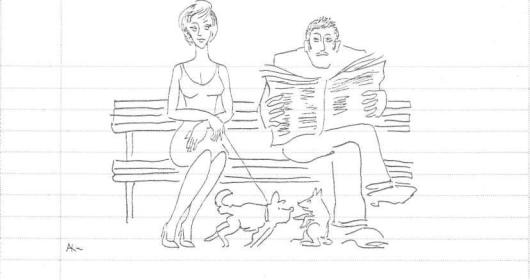

CONVERSATION
•

Conversation
I N T R O D U C T O RY PASSAGE
She: Excuse me, I usually don't strike up a conversation with strangers, but can you tell me what kind of dog that is? I've never seen one like that before.
He: It's a bull terrier. I gather from your accent that you're not American, but you speak English very well!
She: Thanks. To tell you the truth, I still have trouble with English, especially vocabulary.
He: It's funny, I was just reading an article about the English language. Can I tell you about it?
She: Sure. Go ahead.
He: It says that an educated adult has a vocabulary of about 250,000 words. And listen to this—English has more words than any other language; there are about 450,000 words in the dictionary!
She: Oh, come on. That's impossible.
He: I'm not making it up. It's right here in the paper.
She: Well, now I understand why it's difficult for me to express myself.
He: I think you are able to get your ideas across very well.
She: Yes, but when people ask me the simplest things, sometimes I just clam up.
He: You've touched on an interesting point. In the article, it says that the everyday words in English come from Anglo-Saxon, but the sophisticated words come from Latin. If your language comes from Latin, it stands to reason that it would be easier for you to discuss politics than to discuss everyday life.
She: I'm very sorry but I completely disagree with your theory.
He: Well, now that we aren't strangers anymore, perhaps I could talk you into continuing this conversation over dinner!
She: Okay, but no politics, please.

•1 Conversation
N O T ES
IDIOMS AND THE POSITION |
|
|
OF THEIR OBJECTS |
GRAMMATICAL NOTES |
STYLE |
1.strike up
object is usually a noun
2. rather from |
[ |
] |
object is usually a noun |
|
|
|
|
|
|
3 |
to tell [you] [the truth] |
4 |
tell |
[ |
] |
ahout |
[ ] |
5.go ahead
6 |
listen |
to |
1 |
|
|
|
|
7 |
c o m e on |
imperative form only |
|
|
|
|
|
8 |
m a k e |
[ |
] up |
|
|
|
|
9 |
get |
1 |
] across |
|
|
|
|

|
Conversation |
5 |
|
10. clam up |
|
informal |
|
11. touch on
12. it stands to |
[reason] |
informal |
|
|
|
|
|
13.disagree with
14. talk [ |
1 into \ |
1 |
object of the prep, is usually the -ing form |
Use this page for o n e or m o r e of the following exercises:
•Write the meaning of the idiom.
•Write sample sentences.
•Look for the idioms in short stories, novels, newspapers, or magazines, and copy the sentences containing them.
•Give examples of appropriate direct objects or objects of the preposition for each idiom that requires an object.
•Practice saying the idioms with correct stress. In general, verbs and particles are stressed, but prepositions are unstressed.
I.DEFINITIONS
DIRECTIONS: Mark the answer that is the closest synonym for the italicized idioms.
1.He loves to talk and can strike up a conversation with anybody .
a. ( ) begin
b . ( ) end
c. ( ) continue
Conversation
2.I gather from your remark that you are angry.
a. |
( |
) |
hear |
b. |
( |
) |
understand from |
c. |
( |
) |
ignore |
3.To tell you the truth, we're starving.
a. |
( |
) |
to be honest |
b. |
( |
) |
to explain why |
c. |
( |
) |
in other words |
4.Tell us about your accident.
a. |
( |
) |
forget about |
b. |
( |
) |
demonstrate |
c. |
( |
) |
describe |
5.The construction will go ahead as planned.
a. |
( |
) |
be stopped |
b. |
( |
) |
be delayed |
c. |
( |
) |
continue |
6.He is very stubborn and won't listen to anybody.
a. |
( |
) |
pay attention to |
b. |
( |
) |
speak with |
c. |
( |
) |
understand |
7. Oh come on, Michael, we know you're over thirty!
a. |
( |
) |
stop saying something that isn't true |
b. |
( |
) |
hurry |
c. |
( |
) |
come with us |
8.She didn't want to go to the party so she made up a good excuse.
a. ( ) asked for b. ( ) wrote
c. ( ) invented
Conversation 7
9.She was so upset that she couldn't get the message across.
a. ( ) ask questions about b. ( ) communicate
c. ( ) receive
10.The witness was so nervous that when the lawyer began to question him, he clammed up.
a. ( ) wasn't able to communicate b. ( ) was shaking
c. ( ) answered immediately
11.During the press conference, the President touched on the unemployment problem.
a. ( ) discussed fully b. ( ) discussed briefly c. ( ) avoided
12.He was arrested for the murder because he looked like the killer.
It stands to reason that he is angry.
a. |
( |
) |
it is surprising |
b. |
( |
) |
he wanted to say |
c. |
( |
) |
it is to be expected |
13.She disagreed with her sister about what to buy their mother for Christmas.
a. |
( |
) |
took the advice of |
b. |
( |
) |
had a different opinion from |
c. |
( |
) |
asked |
14.He wanted to buy a Cadillac but his son talked him into buying a Porsche.
a. ( ) convinced b. ( ) asked
c. ( ) told

8 Conversation
II. W O R D A S S O C I A T I O N
DIRECTIONS: Two of the three choices below can be used with the idiom. Mark the two answers that can be used to complete each sentence correctly.
1.We thought they were going to strike up
a. |
( |
) |
each other |
b. |
( |
) |
a friendship |
c. |
( |
) |
a conversation |
2.The boss said to go ahead.
a. |
( |
) |
forward |
b. |
( |
) |
with the plan |
c. |
( |
) |
without delay |
3.He told his wife about
a. |
( |
) |
the accident |
||
b. |
( |
) |
his experience |
||
c. |
( |
) |
the time |
||
4. I gather from your |
|
|
|
you are upset. |
|
a. |
|
( |
) |
expression |
|
b. |
( |
) |
broken heart |
||
c. |
( |
) |
comment |
||
5.To tell you the truth,
|
a. |
( |
) |
I don't know what you are talking about |
|
|
b. |
( |
) |
it's true |
|
|
c. |
( |
) |
I'm twenty-five years old |
|
6. What kind of |
|
|
|
do you listen to? |
|
|
a. |
( |
) |
people |
|
|
b. |
( |
) |
advice |
|
|
c. |
( |
) |
word |
|

|
|
|
|
|
|
|
|
|
|
|
Conversation |
9 |
|
7. |
Oh come on, you |
|
|
|
|
|
|
|
|
|
! |
||
|
|
a. |
( |
) |
must be kidding |
|
|
||||||
|
|
b. |
( |
) |
are telling the truth |
|
|
||||||
|
|
c. |
( |
) |
are joking |
|
|
||||||
8. |
The |
|
|
|
|
|
touched on her love life. |
|
|
||||
|
|
a. |
( |
) |
article |
|
|
|
|||||
|
|
b. |
( |
) |
speaker |
|
|
||||||
|
|
c. |
( |
) |
advertisement |
|
|
||||||
9. |
It is still difficult for him to get |
|
across. |
||||||||||
|
|
a. |
( |
) |
important information |
|
|
||||||
|
|
b. |
( |
) |
the voice on the radio |
|
|
||||||
|
|
c. |
( |
) |
jokes |
|
|
||||||
10. |
She probably made |
|
|
|
|
|
|
up. |
|
|
|||
|
|
a. |
|
( |
) |
the dress |
|
|
|
||||
|
|
b. |
( |
) |
the whole thing |
|
|
||||||
|
|
c. |
( |
) |
the story |
|
|
||||||
11. |
The |
|
|
|
|
|
unexpectedly clammed up. |
||||||
|
|
|
|
|
|
|
|
|
|||||
|
|
a. |
( |
) |
message |
|
|
||||||
|
|
b. |
( |
) |
entertainer |
|
|
||||||
|
|
c. |
( |
) |
patient |
|
|
||||||
12.The agent couldn't talk the young couple into
a. |
( |
) |
buying the house |
b. |
( |
) |
anything |
c.( ) join
13.It stands to reason
a. |
( |
) |
he will be fired |
b. |
( |
) |
it is expected |
c. |
( |
) |
she will ask for a divorce |

10Conversation
14.Why do you always disagree with your.
a. |
( |
) |
son |
b. |
( |
) |
boss |
c.( ) opinion
III.THE POSITION OF THE OBJECT
DIRECTIONS: Fill in one of the blanks (a or b) in each sentence with the object given in parentheses. Three of the sentences do not have objects. For those sentences, do not write anything.

Conversation 11
13.When one student is finished, the next should go^
ahead |
|
(it) |
14. She wanted to strike^ (a conversation)
IV. LISTENING C O M P R E H E N S I O N ANSWER S H E E T
Part I
DIRECTIONS: You will hear a short dialogue followed by a question. After you hear each question, read the three choices and mark the response that answers the question correctly.
1. a. |
The woman always talks to other men. |
b.The woman couldn't find the restaurant.
c. The woman started a conversation with a stranger.
2.a. The woman wants to see London, Rome, and Athens only.
b. |
The woman prefers to see only one city. |
c. The woman wants to see everything in Europe.
3.a. The romance was coming along.
b. |
The story wasn't true. |
c.He hadn't heard about it.
4.a. He listened to it.
b.He turned off the tape recorder.
c.It was difficult to hear.
5.a. He thinks it is better not to tell her the truth.
b.It is serious.
c.He really doesn't know if it is serious or not.

12 Conversation
Part II
DIRECTIONS: You will hear a situation presented in one or two sentences. Listen to each statement and mark the response that most closely corresponds to the situation.
1. a. |
Arthur didn't become a member. |
b.Arthur joined the club.
c.Arthur liked the facilities at the club.
a. Most of the interview was about her addiction to drugs.
b.She didn't talk about her operation.
c.She talked about her marriage.
3.a. Caroline's mother-in-law wants her to get a divorce.
b.Caroline's mother-in-law wants her to stay married.
c.Caroline is always fighting with her mother-in-law.
4.His parents named him Anthony Winston when he was born.
b.He gave himself the name Winston.
c.He gave himself the name Anthony.
5.a. He prefers to keep his tips secret.
b.He reports all his income to the Internal Revenue Service.
c.He reports his tips on his income tax form.
6.a. The victim was so nervous and afraid that she couldn't speak.
b.The lawyer asked the robber many questions.
c.The robber was nervous.
7.a. It is hard to make a choice because there are so many breeds.
b.The choice is very limited.
c.You must have a reason for buying a dog.

Conversation |
13 |
8. a. |
It is better to take as much time as necessary for each |
|
question. |
||
|
||
|
When you see a difficult question, don't even try to find |
|
|
the answer. |
|
|
It is better not to spend too much time on a difficult |
|
|
question. |
9.a. Paul probably doesn't like war.
b. |
Paul probably thinks war can be good. |
c.Paul likes all of Benjamin Franklin's sayings.
10. a. |
The travel agent said not to take a vacation in July, |
|
August, and September. |
||
|
b.The travel agent wanted to make it clear that it would be hot and humid during your vacation.
c.The travel agent said it would be too hot for your dog.
V. FILL IN
DIRECTIONS: Fill in the blanks with the correct preposition or particle.
Man: |
I just overheard your conversation with that policeman. |
|||||||
|
I gather |
. your accent you are French. |
||||||
Woman: |
Yes. |
|
|
tell you the truth, I have |
been here only |
|||
|
three days. |
|
|
|
|
|
||
Man: |
Well, I'm glad I decided to strike |
|
|
. a conversation |
||||
|
|
|
|
3 |
|
|
||
|
|
|
|
|
|
|
. the city. |
|
|
with you. Maybe I can tell you |
|
||||||
Woman: Were you born here? |
|
|
|
|||||
Man: |
No, but I spent most of my adult life here. |
|
||||||
Woman: |
It stands. |
reason you know a lot about the city. |
||||||

Conversation
Man: |
Perhaps I could talk you |
|
|
gomg for a ride on th( |
|||||||||||||
|
|
|
|
|
|
|
|
|
|
|
|
|
6 |
|
|
|
|
|
ferry. I could show you the most important sights from there |
||||||||||||||||
Woman: I'm sorry but I have a class in twenty minutes. |
|||||||||||||||||
Man: |
Oh, come |
! |
|
|
|
|
|
|
|
|
|||||||
|
|
7 |
|
|
|
|
|
|
|
|
|
|
|
|
|
||
Woman: |
I'm not making it |
|
|
|
|
|
|
|
; I'm really a student. |
||||||||
|
|
|
|
|
|
|
|
|
|
|
|
|
|
|
|||
Man: |
Listen |
|
|
that—the ferry is leaving in two minutes. |
|||||||||||||
|
|
|
|
|
|
|
|
|
|
|
|
|
|||||
|
It's a short ride, and besides, on the way I could teach you |
||||||||||||||||
|
how to get your ideas |
|
|
|
|
in English. Practice is |
|||||||||||
|
much more important than sitting in a classroom. |
||||||||||||||||
Woman: |
I'm very sorry but I disagree |
|
|
|
|
|
you. Anyway, I |
||||||||||
|
usually clam |
|
|
|
|
|
when I'm with strangers for more |
||||||||||
|
|
|
|
|
|
12 |
|
|
|
|
|
|
|
|
|
|
|
|
than a few minutes and . . . . |
|
|
|
|
|
|||||||||||
Man: |
You have touched |
|
|
|
|
|
|
|
|
an interesting point. Maybe |
|||||||
|
|
|
|
|
|
||||||||||||
|
you have trouble because you don't have enough practice |
||||||||||||||||
|
speaking with people. |
|
|
|
|
|
|||||||||||
Woman: |
That's not the point. If you had let me finish . . . . |
||||||||||||||||
Man: |
Oh I'm sorry. Please, go |
|
|
|
|
|
|||||||||||
|
|
|
|
|
|
|
|
|
|
|
|
|
14 |
|
|
|
|
Woman: What I wanted to say was, I'm married. |
|||||||||||||||||
Man: |
Big deal! |
|
|
|
|
|
|
|
|
|
|
|
|
||||

|
Conversation |
15 |
|
VI. PRACTICAL APPLICATION |
|
|
|
Barbara Stevenson is being considered |
for t h e position |
of adver- |
|
tising director at a major c o m p a n y . After |
interviewing her, |
the |
per- |
sonnel director wrote the following: |
|
|
|
Barbara Stevenson
1.She expresses herself well.
2.She has a good imagination.
3.She is very friendly.
4.She doesn't like to talk about her previous job.
5.She is too easy with the people working for her.
6.She doesn't always answer the question.
7.She spends a lot of time talking about her children.
8.She proved that she knows everything about the advertising business. I recommend her for the job.
DIRECTIONS: Next to each idiom below, write a sentence using the information the personnel director wrote about Barbara Stevenson. Use the idiom in your sentence.
1. |
(get across) |
|
: |
|
|
|
|
|
|
2. (make up)
3. (strike up)
4. (touch on)
5.(disagree with)

16Conversation
6.(listen to)
7.(tell about)
8.(talk into)
VII. ADDITIONAL EXERCISES
Make up a story about the picture at the beginning of the chapter. Use as many idioms as possible. This exercise can be written or oral. Ask each other questions about the picture. You must use an idiom in your response.
Use the lines below the picture for a dictation exercise. The teacher or a student dictates the introductory passage and the students write it.
Rewrite the introductory passage in indirect speech.
